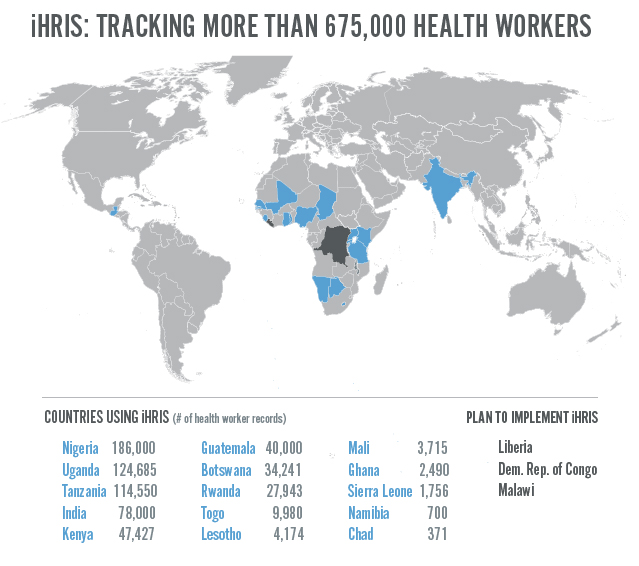
Countries Save Over $100 Million with Open Source Software and Powerful Data
The free, open source iHRIS software has now given 16 countries powerful data-management capabilities that, if purchased from for-profit companies, would have cost over $100 million in combined licensing fees. Instead, government agencies in Africa, Latin America, and India now use the affordable iHRIS to store over 675,000 health worker records, allowing officials to track, manage, and plan for their health workforces.
Fifty-seven countries around the world suffer from critical shortages of health workers. Data are vital for those countries as they struggle to add skilled personnel and build their health sectors. Governments need to know, for example, how many health workers they have, where those health workers are, what skillsets they offer, and whether they are licensed and qualified to provide high-quality care.
In the past year, officials in Guatemala, Namibia, Senegal, and Chad have adopted the iHRIS software, and several other countries will follow suit in the coming year.
IntraHealth International, through the former Capacity Project, launched the first version of iHRIS in 2007. CapacityPlus continues to develop the core iHRIS software and release updates and, along with other IntraHealth-led projects, partners with countries around the world to roll out the software and train staff members to use and maintain it. iHRIS has helped those countries to leave behind the scattershot, paper-based filing systems of the past in favor of robust data and electronic records, which allow users to easily find, share, organize, and manage their information.
The software suite has grown to offer several applications, each of which addresses a specific workforce issue:
As the demand for this software grows, so does the need for local technologists who can work with it. That’s why this year the University of Dar es Salaam in Tanzania held the first of what will be an annual iHRIS Academy, bringing together iHRIS users and developers from seven African countries to pool their expertise and collaborate to solve common data-related challenges.
Sustainable, adaptable iHRIS
Given iHRIS’s open source approach, developers can easily customize the software to fit their own unique needs.
For instance, local governments in Tanzania use iHRIS to track civil service employees. The Christian Social Services Commission—a faith-based organization that employs over 40% of the country’s health workers—uses it too.
And in Zanzibar, the semi-autonomous archipelago off the coast of Tanzania, the Ministry of Health is one of the first to use iHRIS in conjunction with another tool called WISN (or Workload Indicators of Staffing Need). The two open source resources helped the Ministry to assemble the data it needed to secure additional funding for the archipelago’s health sector. As a result, Zanzibar’s health workforce has grown by over 25% during the past three years.
While iHRIS was originally developed to manage health sector data, some countries and organizations have gotten creative.
“In Tanzania, for example, it’s been adapted to track not only health workers but also parasocial workers,” says CapacityPlus’s Dykki Settle. “And the University of Dar es Salaam has even adapted iHRIS to track their institutional assets, such as furniture and computers. The fact that iHRIS provided a platform that they could easily adapt to their specific need means that the tool has value far above and beyond anything we originally set out to do.”
Local innovations like these will be the key to sustainability for iHRIS, Settle says.
“By using locally owned and supported software, countries can take the millions of dollars they would have spent on proprietary systems and put those resources toward increasing their health workforces and providing more health care,” he says, “while also building the country’s capacity to innovate and save. This pattern—of innovate, save resources, increase resources, and innovate more—creates a powerful cycle of abundance that is helping countries to bootstrap their own national development.”
Help CapacityPlus spread the word about strengthening the health workforce. Follow us on Twitter and like us on Facebook.
Related items:


